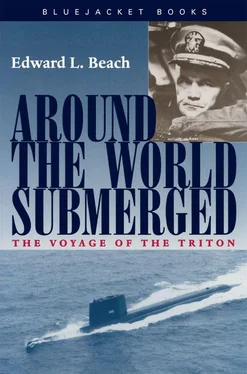“I thought I understood that we had no spare armatures for this thing, Hardman,” I said.
“We don’t, sir, but this damned motor shouldn’t have broken down. First, we’re going to find out why, and then we’re going to rewind it.”
“Rewind the armature!” I expostulated. “I’ve heard of Navy Yards and tenders doing that with all the extra equipment they have, but I know darned well we don’t carry any of that kind of gear!”
Hardman, as I had reason to know, was a man of great positiveness, as well as being an efficient Electrician’s Mate. His whole bearing spoke determination as he answered, “This damned motor is my piece of gear, and it’s going to be running before we get back.” His jaw muscles bulged slightly as he snapped out the last few words.
I remember wishing at the moment that I had had some appropriate rejoinder worthy of the occasion. All I could think of to say was, “Good!”
But if I was surprised in the engine room, what I saw that same day in the electronics technician’s storeroom was astonishing. Electronics Technicians G. E. Simpson, M. F. Docker, and N. L. Blaede had started constructing a new fathometer! A stainless-steel cooking pot had been commandeered from the galley, and a number of stainless-steel rods, plus considerable small, fine copper wire from the engineering and electrical spare parts petty officers. The technicians had calculated the resistances and impedances and were busily engaged in constructing a new sound head.
“Certainly it’ll work,” said Docker. “The question is whether it will be powerful enough to do the job for us, and whether we can find some way to put its signal into the water.”
Another project they were working on was the conversion of one of our general announcing speakers into a sonar transmitter, a conversion that involved developing a means of making it both watertight and pressure-proof at the same time, and yet able to transmit and receive sonar signals. A third, and much more primitive idea, beating on the bottom of the hull with a hammer, was ready for trial as soon as we happened into shallow water again. All these projects were based on the hope that we might be able to catch an echo on one of our other sonar sets and, by timing it, ascertain the depth of water.
I could only marvel at the ingenuity of the American sailor. These experiments might not work, but all three were certainly worth trying.
The last-named idea required no special preparation other than finding the best spot for hammering on the hull, a suitably heavy hammer, and a brawny sailor. Years ago, when the submarine S4 lay sunk on the bottom of Cape Cod Bay, communication had been maintained with the survivors by means of hammering against the hull. It was just possible that enough energy could thus be placed in the water for our modern and acutely sensitive sonar to pick up a returning echo from a nearby shoal.
When it came time to make the test, Torpedoman Second Class Wilmot A. Jones drew the assignment of being the human fathometer. The forward torpedo room bilges, beneath the torpedo tubes themselves, appeared to be the most suitable spot for the effort. Armed with a heavy sledge hammer, Jones crawled down into position.
The number of hours poor Jones spent at his task, hammering with prodigious force upon the unyielding structure of Triton’s hull in the hopes that somehow a faint return might be heard, are unrecorded. We heard him clearly inside the ship, but no matter how hard he hammered or how shallow the water, no echo was ever picked up.
Had we been able to project all the sounds straight down through some sort of a diaphragm or sound-channeling arrangement, better results might have been achieved, for, after all, that is the principle upon which the fathometer itself operates. But this was not possible, and the only tangible result of Jones’s efforts was a cartoon which appeared the next day in the Triton Eagle, showing a section of the forward torpedo room bilges with an idiotic-looking sailor sucking his thumb and crouched below a set of torpedo tubes. He was labeled “Jones,” to be sure he would be properly identified, and with his free hand he was swinging a hammer and pounding on the hull. The balloon above his head held the words, “Da Da Da, Whee—I’m a fathometer.”
Nevertheless, we had a good idea of the depth of the water. As we approached the charted shallow areas, our search sonar detected shallow water ahead and to port, where we had expected it. In the meantime, Mike Smalet, our gravity-meter expert, noted definite changes in the gravity readings recorded by the “monkey in a cage.” While the change in gravity might have resulted from some other cause, its correlation with the search sonar could not be ignored.
Crossing the Pacific from Easter Island to Guam took us two weeks, and it was during this trip that Will Adams decided the greatest danger of boredom existed. The same trip took Magellan three months, during which he and his crew nearly starved to death. Our desire to emulate his feat did not extend to culinary duplication, and the various breaks in our monotony which Will devised were to a large degree dependent upon food (Poi, near Hawaii, for example).
On Sunday evening, the twentieth of March, Triton reached her closest point of approach to Pearl Harbor, and we held a ship’s party in honor of the occasion. Naturally, it had to be a Hawaiian Luau. My memories of such an occasion stemmed from the war years, for I had not been in Hawaii since then. But Will had, and so had Ship’s Cook First Class William “Jim” Crow. In fact, Will had given the matter some forethought, and one of the announcements before departure from New London was that all hands were advised to bring along some sort of sports togs or shirts (he had been very cute about this), similar to Hawaiian “Aloha” shirts, for our expected ship’s party in the Bahamas. He had also suggested that anyone who had a musical instrument bring it along.
Bob Fisher and Will Adams spent considerable time on the Luau menu. And even though I had been pretty well prepared for what I was to see at 1800 when the party started, I was amazed at what they had done. A coconut tree, bearing two large brown coconuts garnished with great purple leaves, “grew” out of the deck. A number of Hawaiian leis were strung about the overhead, some looking suspiciously like the commercially manufactured article made with bits of colored plastic paper, others obviously homemade. On the bulkheads were drawings of Hawaiian scenes. Having seen some of Tom Thamm’s work before, I had no doubt that a great deal of this was due to him. There were brightly colored shirts and two or three battered but gaudy straw hats. There were even hula skirts, made of cloth strips and string. And the food, with the exception of Will Adams’ poi, was uniformly excellent. There was no octopus, the Navy standard menu having no provision for serving octopus in any form, but we did have raw fish garnished with some sort of hot sauce, French-fried shrimp and ocean scallops, sweet-and-sour pork, fruit, salted nuts, and iced punch.
To my surprise, even the ersatz poi had a number of takers, although so far as I was concerned, it was just like Hawaiian poi: paste without taste. And when the meal was over, and a large, specially baked cake cut and passed around, we all relaxed for an hour, singing songs of the Navy and the submarine force dating back to the war years and before.
From the Log:
Monday, 21 March 1960 Shortly after midnight, as we came to periscope depth for celestial observations, it was discovered that the sextant built into our new periscope has gone out of order. This will be a serious blow if we can’t fix it, ameliorated only by the fact that running continuously submerged as we are, we find that our dead-reckoning is most phenomenally accurate. Rarely has our estimated position deviated from our actual observed position by more than a mile or two. It appears that currents and other forces affecting surface ships during transits are much less a factor during submerged runs. To paraphrase an aphorism, “deep waters run still.”
Читать дальше












